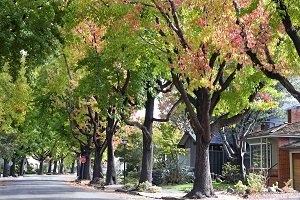About 350,000 communities have HOAs in the United States. HOA stands for homeowners association. These are residential properties with a board of directors that enforce community rules and regulations. It’s easy to understand the HOA definition; however, there’s more to it than the question, “What does HOA mean?” Here’s a detailed explanation of homeowners associations and what that could mean for you.
What Does HOA Mean?
 If you are moving to a community that has a homeowners association, or are looking for a better way to manage your community, it’s important to understand what HOA means.
If you are moving to a community that has a homeowners association, or are looking for a better way to manage your community, it’s important to understand what HOA means.
What’s an HOA? It’s an organization that governs condominiums, townhouses, and single-family homes. If a community has an HOA, everyone who buys property automatically becomes a member of the association. In order to move in, homeowners must sign a contract that states you have to follow community rules and regulations as well as pay association fees each month. Non-compliance with these stipulations may lead to monetary fines, sanctions, or even litigation.
Advantages and Disadvantages of HOAs
 HOAs have their fair share of advantages and disadvantages. They help preserve or improve property values by taking care of maintenance and repairs, landscaping, and other community projects. Homeowners pay an amount of money each month. In exchange, they have an assurance that their community will be beautiful, clean, and well-maintained.
HOAs have their fair share of advantages and disadvantages. They help preserve or improve property values by taking care of maintenance and repairs, landscaping, and other community projects. Homeowners pay an amount of money each month. In exchange, they have an assurance that their community will be beautiful, clean, and well-maintained.
On the other hand, homeowners do not have full freedom to what they want to their property. HOAs usually have restrictions on what color your house should be painted, what kind of fence you can have, or what style of landscaping should be followed. Some HOAs may be strict in this regard for the sake of maintaining property values and curb appeal.
If you want to see if HOA living is right for you, we will be breaking down the many aspects of what HOA means. Here’s more information that you need to know:
What Do HOAs Do?
 HOAs control the public areas of your community — such as the playground, swimming pool, clubhouse, gym, etc. — to ensure that they are maintained periodically. These amenities have to look and function well for residents to be able to enjoy them. HOAs also regulate the exterior of each property so residents may have to stay in a certain color scheme or have landscaping and remodeling restrictions. Residents’ HOA dues support the services and benefits provided to the communities.
HOAs control the public areas of your community — such as the playground, swimming pool, clubhouse, gym, etc. — to ensure that they are maintained periodically. These amenities have to look and function well for residents to be able to enjoy them. HOAs also regulate the exterior of each property so residents may have to stay in a certain color scheme or have landscaping and remodeling restrictions. Residents’ HOA dues support the services and benefits provided to the communities.
HOAs elect a board of directors to ensure that residents follow the rules and regulations. Board members are homeowners who take on voluntary positions to help manage and maintain the community. They will meet periodically to make important decisions for the well-being of the community.
How Do I Know If My Community Has an HOA?
When you are deciding to purchase a home, you will receive a full packet of information about the property that you are considering. This will tell you if the community you are looking to move to has an HOA. Make sure to look over all the required obligations for your future association if you decide to purchase the property. By having a clear understanding from the beginning, it will be possible to avoid common mistakes and pitfalls that residents make when they purchase a property in a community with specific regulations.
Am I Required to Pay HOA Dues?
 If you are moving to a community that has an established HOA, you will be required to pay the annual dues. Many residents have had issues with this recently because they don’t want to pay for services that they don’t use; however, if residents are living in a community with a homeowners association, they have to abide by the contract that they signed when they move in. Signing this contract means that residents agree to all the fees and obligations required to reside in the community.
If you are moving to a community that has an established HOA, you will be required to pay the annual dues. Many residents have had issues with this recently because they don’t want to pay for services that they don’t use; however, if residents are living in a community with a homeowners association, they have to abide by the contract that they signed when they move in. Signing this contract means that residents agree to all the fees and obligations required to reside in the community.
Do HOAs Need to Follow Any Rules?
States closely monitor HOAs to prevent issues such as HOAs fraudulently charging residents. Certain states have created strict requirements for HOAs to follow to protect residents from overpaying.
HOAs are required to have governing documents such as CC&Rs and bylaws. These bylaws should be distributed to all residents within the community so that they are clear about what their obligations are to the community.
HOAs need to file taxes like any other organization or business. They can be audited as well. HOAs should exercise caution with member dues to organize their finances in the most beneficial way possible.
How Do HOAs Deal With Community Management?
 Many HOAs greatly struggle with handling the multitude of requests that their community receives regularly. HOAs, particularly if they have hundreds of homes, can get disorganized. They might not give their residents the quality of management service that they deserve. They can also struggle with their HOA bookkeeping practices that, if managed properly, could allow their reserve fund to have more capital in the event of an emergency.
Many HOAs greatly struggle with handling the multitude of requests that their community receives regularly. HOAs, particularly if they have hundreds of homes, can get disorganized. They might not give their residents the quality of management service that they deserve. They can also struggle with their HOA bookkeeping practices that, if managed properly, could allow their reserve fund to have more capital in the event of an emergency.
Due to HOA laws, self-managed communities should be diligent about their accounting and finances. If not, they might have to deal with massive fines and sanctions. These communities can choose to work with an HOA accounting and management company. They can help you streamline HOA process and systems, as well as reduce stress and workload for the board.
Can HOA Mean a Higher Standard of Living for You?
There’s a reason why 26.6 million households are part of an HOA. Being part of a community affords homeowners with certain privileges such as access to amenities, high property values, and security. In exchange, you have to follow community rules and pay monthly dues. Once you determine what HOA means for you, it will be easier to find a community that can meet your needs.
If you have more questions about what HOA means, or how an HOA management company can assist your community, do not hesitate to give us a call.
RELATED ARTICLES:

